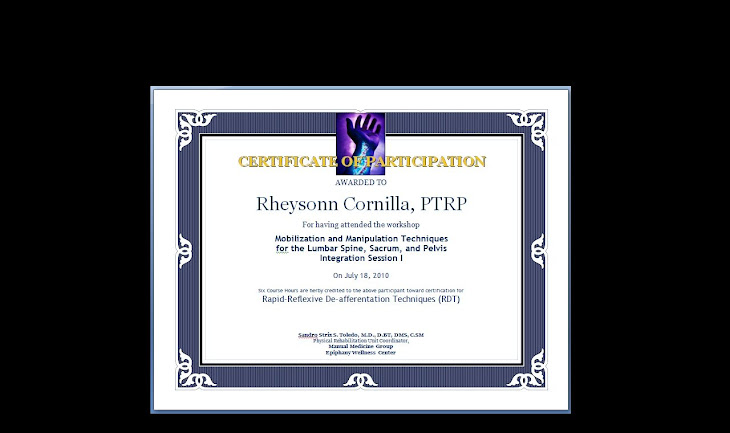It's what you do consistently and persistently that changes your world.
Welcome to an Open Source Outline. This workshop outline is meant to be edited, completed, and evolved by our workshop participants.
This outline is for the March 07 2010 workshop on
the Hands-on Treatment of
Shoulder Somatic Dysfunctions.
It's what you do consistently and persistently that changes your world.
Welcome to an Open Source Outline. This workshop outline is meant to be edited, completed, and evolved by our workshop participants.
This outline is for the March 07 2010 workshop on
The Hands-on Treatment of
Shoulder Somatic Dysfunctions.
Disclaimer:
This workshop is not meant to replace good clinical judgment and experience. Participants are meant to practice within the bounds set by their individual and institutional licenses, their certifications, and their experience. When in doubt, it is always best to secure clearance from your team physician.
Registration form:
Practitioner name: _________________________________________
Designation: (PT/OT/MD/DO/DC/LAc) _______________________
Institutional Affiliation / Clinic Base(s): _________________________
______________________________________________________
Specialization(s) / Certifications: (Dorn Method / Bowen Therapy / OMT / NDS / MUA / Peripheral Adjustments / Maitland / Mulligan / Sports Medicine / Acupuncture ...)
Postural Evaluation Notes:
Note:
Shoulder correction tends to follow correction of pelvic tilt.
Note how handedness affects hip positioning. Low shoulders tend to appear as compensations for high hips.
What are the origins / insertions / actions of the:
levator scapulae
rhomboid minor
rhomboid major
what are the medial rotators?
What are the lateral rotators?
Does shoulder girdle substitution exist? Is it that rotation is difficult, and shoulder girdle movement compensates for this ROM limitation?
Notice how upper and lower Pectoralis major tightness can be assessed with the patient supine, flat on back, with the arm extended and abducted.
How would you perform an assisted stretch of the shoulder adductors (teres major and latissumus dorsi)?
How would you perform an assisted traction stretch of external rotators?
How would you perform a Pectoralis minor stretch?
How would you perform an adductor stretch against the floor?
How would you perform an adductor stretch against the wall?
Why do a "Protocol-Driven" workshop?
How do we do the two-table, three-person audit for hands-on workshops? (Patient-Operator-Auditor)
Goal Setting. Why are you here? What do you hope to accomplish?
What is a Bayliss collapse? How would you isolate a technique to a local area?
What is the "Nullification Process" for determining the Primary Biomechanical Dysfunction?
The buffet notion. The Roller-coaster notion.
Beginning with the end in mind.
Can I lend you my learning curve?
How do I get referrals from MDs?
Feedback? How are you enjoying your experience so far?
The effect of belief on effort.
What feedback am I getting, and what adjustments must I therefore make?
Some concepts:
The Neil-Asher Technique
"No-hype" Adjustments
Kinesiology
Reflexive De-afferentation Techniques
March 07, 2010. Pasig City, Philippines.
10 am to 2 pm. Contact Dionne to confirm attendance.
"I honestly don't get tired
of what I do"
(anonymous manual medicine practitioner)
Welcome to the Shoulder 1
Manual Medicine Session.
This is a Continuing Education Session for Physical Rehabilitation Professionals who see the limits of current practice, understand that more can be done, and want to learn how to deliver structural and functional changes that their patients deserve.
The focus of this session will be how to treat the shoulder. The techniques are hands-on.
The playing field will be level: most have not seen these techniques.
The learning filed will be multifocal: you get to see what the newbie sees, get to do what the intermediates do, and get to refine from the perspective of those who have advanced in these techniques.
There are no wrong answers here.
The more questions you bring the better.
Contact Dionne for confirmation of
Attendance and bravery
At: (+63) 0905 4 2 69 4 96















No comments:
Post a Comment